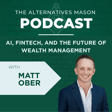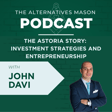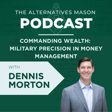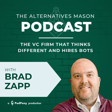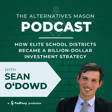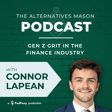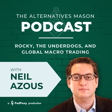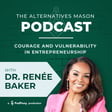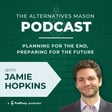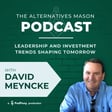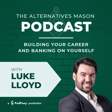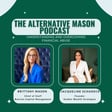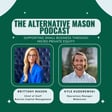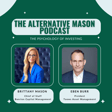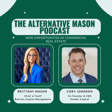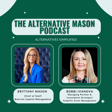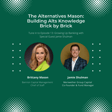Become a Creator today!Start creating today - Share your story with the world!
Start for free
00:00:00
00:00:01

The Alternatives Mason: Building Alts Knowledge Brick by Brick | Episode 27 | Real Estate and Commercial Investment in Crisis Markets with Greg Friedman
Greg Friedman has a financial journey that starts in his early childhood, investing his birthday money, and has brought him to launching Peachtree Group in 2007. In this episode, he explains what he calls the Mispriced Risk Business and how he’s overseen $11 billion in real estate investments.
Key takeaways:
- Greg’s first memories and how they shaped his entrepreneurial mindset.
- The difference between happiness and fulfillment.
- Mispriced risk and how to make money out of it.
- The importance of relationships for any business.
Connect with us below!
Transcript
Introduction of Host and Guest
00:00:00
Brittany Mason
Hello everyone, I'm Brittany Mason and we're back to you again with another episode of the Alternative Mason where we are building your old knowledge brick by brick.
00:00:08
Greg Friedman
It's
00:00:11
Brittany Mason
And today on our episode on the ah Alternative Mason, I'm thrilled to introduce Greg Friedman, the managing principal and CEO of Peach... My goodness, I'm sorry, I'm going to start that all over.
00:00:25
Greg Friedman
it's all good.
00:00:29
Brittany Mason
Hello, everyone. i am Brittany Mason, your host of The Alternative Mason, back with another episode where we are building your alt knowledge brick by brick. I am so excited because today's episode, i am thrilled to announce and introduce to you Greg Friedman, the managing principal and CEO of Peachtree Group.
00:00:50
Brittany Mason
Since co-founding the company in 2007, has overseen over $11 billion in investments across commercial real estate and other ventures. with more than 25 years of expertise in credit and equity investing, particularly in hospitality and commercial real estate.
00:01:09
Brittany Mason
Greg brings a wealth of knowledge to the table. He's also a proud member of the University of Texas Austin graduate and actively contributes to the industry as a board member of the American Hotel and Lodging Association and the Texas McComb School of Business.
Greg's Early Lessons in Investment
00:01:27
Brittany Mason
real estate fund advisory board. Wow. Quite a bio. Thank you so much, Greg, for taking the time to chat with us today. It's wonderful to have you on the show.
00:01:38
Greg Friedman
and Thanks for having me on your show. So I'm excited to be part of part of your show and hopefully we'll have a good conversation today.
00:01:45
Brittany Mason
Yes, absolutely. I like to start things out, you know, with just getting to know your background better about you. ah You know, how was the seed planted for you to be interested in finance?
00:01:58
Brittany Mason
What's your earliest um money memory?
00:02:02
Greg Friedman
It's a good question. So my earliest memory, I was child at like, call it age four or five. My grandfather used to make me literally read, yeah like go through the business section of the, you know, like the newspaper and look at like stock, all the different stocks and look at the pricing and how the stocks were trading and, you know, understand like what price to earnings meant and start to understand exactly how these companies were valued. So that was like the,
00:02:30
Greg Friedman
like the initial stages of just learning investments, learning how to, you know, look at investing capital, how to understand, you know, the financial side of stuff. And that was at a very early age. And my grandfather used to basically make make me take any spare money I had and invest it into stocks. So I picked, you know, one or two stocks to invest into.
00:02:51
Greg Friedman
And then I would, you know, reinvest in these um dividend reinvestment programs back when I was younger. And he would match whatever I would invest you know my own personal money, which you know back then I didn't have a lot of money. was It was like money from like birthday parties and things like that. So it was wasn't a lot of money, but it was the initial stages of understanding how if you invest it wisely, you can make a lot of money. If you invest it keep on investing and reinvesting and really compound and you can do really well you know financially long term.
00:03:20
Brittany Mason
That is fascinating. I'm sorry. Did you say you were about four or five when you started looking at the paper with that?
00:03:25
Greg Friedman
Yeah, so it was literally at the age of five, I can remember him sitting down trying to explain it.
00:03:26
Brittany Mason
Wow.
00:03:31
Greg Friedman
I'm not saying i was doing a good job understanding it, but he was he was trying.
00:03:33
Brittany Mason
i Yeah. Yeah.
00:03:35
Greg Friedman
So, and I was a...
00:03:36
Brittany Mason
But you were getting familiar with it. Yeah. At such a young age.
00:03:39
Greg Friedman
Yeah.
00:03:40
Brittany Mason
So do you think there is um an age that is too early to start with any sort of like foundation of, of,
00:03:45
Greg Friedman
I don't... ah
00:03:49
Greg Friedman
I think it's one of those where I don't think there's too early of an age. I think it's, I'm a big believer because I was always very entrepreneurial as a child. Like I did so many different businesses. um I used to go and every summer I used to spend working for my grandfather's office, you know, back when I was like,
00:04:06
Greg Friedman
seven and eight, nine and 10 years old, ah stuffing envelopes
Influence of Greg's Grandfather
00:04:10
Greg Friedman
and doing things like that. But I think it just drives that comfort level of being in a business environment. but Again, it's not saying I was learning anything of use today for what I do today, but it made me very comfortable being in a business environment.
00:04:16
Brittany Mason
and balance.
00:04:24
Greg Friedman
At a very early age, I got comfortable being in meetings and understanding how business and relationships were you know created. And I think it's it's no different than the way you know you learn, the way if you're comfortable in those settings, you know you're going to thrive a lot easier than if you're uncomfortable and you're trying to overcome anxiety or whatever the case may
00:04:44
Brittany Mason
So your grandfather, he was awesome so he was in financial services, is that correct?
00:04:50
Greg Friedman
be. Yeah, he was ah so he was very entrepreneurial. he was um So his family had immigrated the U.S. s from Russia, and he came here at a and very or He was born here in the U.S., but he was he was born out of, i would say his family struggled financially, but he was always very entrepreneurial, went to fault in World War II, ended up becoming an optometrist, and then he creating lot of different businesses. And he had everything from, you know an early age, he had like vending machines or whatever, and then to all of a sudden doing, he was going out and buying a bunch of real estate. He owned a home building business at one point.
00:05:26
Greg Friedman
And then he actually went in and started buying hotel properties, you know, beyond just owning real estate, commercial real estate, you know, and hotel properties. He also went in and um started financing people that were buying, you know, real estate.
00:05:40
Greg Friedman
So he would go in and provide loans for you know people that needed you know money to to buy a hotel or other commercial real estate property types. And so he had, you know, he just had that constant entrepreneurial spirit. So he was the type person that although he was a,
00:05:55
Greg Friedman
technically an optometrist by trade, he exceeded you know you made much more money being in business than being
00:06:02
Brittany Mason
yeah Yes, yes. And so obviously, yes, he passed that entrepreneurial spirit on down to you.
Key Business Principles
00:06:09
Brittany Mason
So in your young age, then, since you you just you had this type of grit so young, were there any types of businesses or like hustles you were trying to do at school in your young age?
00:06:22
Greg Friedman
mean, I tried
00:06:23
Greg Friedman
I tried everything. So like some of this stuff worked better than others.
00:06:25
Brittany Mason
Yeah. Yeah.
00:06:27
Greg Friedman
And I grew up, obviously I'm 47. So I mean, this is going back like 35 years ago and stuff 30 years ago, but like some of the, i would say more entertaining or successful ones I had done, like I had a paging business at one point, you know pagers is sort of funny just because when I talked to my children about it, they're like, what is a pager?
00:06:46
Brittany Mason
What is that?
00:06:46
Greg Friedman
They started, yeah, exactly.
00:06:48
Brittany Mason
remember that I remember them.
00:06:48
Greg Friedman
So yeah.
00:06:49
Brittany Mason
remember them actually.
00:06:50
Greg Friedman
Yeah. Yeah, so I used sell page you know pagers at the flea market. And then I would um i would basically sublease the lines from like some of the larger paging companies like PageNet. And then you know I'd make the spread.
00:07:02
Greg Friedman
that was ah It was ah actually a profitable business. It wasn't game-changing for me by any means. But it was ah was a good business that ended up getting, obviously, disrupted by you know cell phones and you know other ways to communicate in much more efficient manner. Yeah.
00:07:17
Brittany Mason
In those early days, what do you think is the the most valuable lesson that you learned when you were just getting out there and getting started and making your mistakes?
00:07:27
Greg Friedman
Yeah, so I think it's a couple of different things. One is is having you know that grit and constantly realizing that nothing's ever going to go go according to plan. Everyone's got great ideas.
00:07:39
Greg Friedman
And it's not the idea that works. you actually have to get out there and actually work and actually you know work hard every day. you got to constantly be willing to adapt to the environment. You got to pivot. You got to realize you're going to have a lot of challenges thrown at you.
00:07:52
Greg Friedman
and You just got to learn how to deal with them and just hit them head on. You can't sit there and let, if there's a problem, you can't let it just fester. You got to go deal with that problem because otherwise it's just going to be toxic to what you're trying to accomplish you know within that business or within that investment strategy.
00:08:03
Brittany Mason
Mm-hmm.
00:08:09
Greg Friedman
So I think that was one of the biggest lessons and also just the value of relationships. I mean, I do think relationships are super important because as you develop relationships that allows you, if you're, you know, if you have a business that's predicated on selling a product, you you're going to end up getting more sales. You're going to have people that are going to be helping you sell the product.
00:08:29
Greg Friedman
If you develop the right kind of relationships, or if you're, you know, if you're trying to run an investment management business, it's all about how you treat, you know, obviously you want to produce returns. And that's one of the most critical things is you want to make sure, know,
00:08:42
Greg Friedman
That your clients or whoever is getting not only back their capital, they invest, but they're getting returns, getting compensated for the risk. But probably right up there is being able to develop a relationship and having great communication and transparency because people value that when things aren't working correctly.
00:08:59
Greg Friedman
If everyone knows what's happening, usually they're more willing to work with you to help solve those challenges and issues.
00:09:05
Brittany Mason
Absolutely. How do you build that trust then within your team and your people to have that difficult?
00:09:12
Greg Friedman
Yeah, I think within the team is, yeah. So, I mean, I think a big part is is having, you know, unfortunately back when I was younger, my team was just me. So like it was by myself and maybe I could recruit someone like my sister or someone like that to help out, you know, if she knew it or not the time.
00:09:20
Brittany Mason
Yeah.
00:09:28
Greg Friedman
but But in any case, you know, now we've got a team corporately out of about 300 team members. We've got about 4,000 team members out in the field. And it's it's all about communication. Like you got to get everyone on the same page and the best way to do it and get the trust, you know, bought in.
00:09:46
Greg Friedman
and you know, some of the best ways to do it is is that transparency. It's constant communication. It's letting them know, you know, it's it's really having that communication, but also letting them know that you have their back.
00:09:58
Greg Friedman
Because a lot of times it's easy to throw.
00:09:59
Brittany Mason
Mm-hmm. Yeah.
00:10:01
Greg Friedman
I've seen it so many times where I've worked at other places before starting you know my business back in 2007. But you know before that, I worked for other people. And I've been in situations where when stuff doesn't go right, you get thrown on it under the bus.
00:10:15
Greg Friedman
And that's something i always, I'm a big believer of, you know, the blame goes to the top. So I'm always going to take the blame. And I'm going to work with the team to solve the issue. I don't make the issues their problem. I'm willing to you know stack hands together.
00:10:27
Greg Friedman
or whatever it takes to help solve the issues as they come up.
Peachtree Group's Founding and Growth
00:10:30
Greg Friedman
And I think that's the way you really gain that trust is being, not only being a um a leader and being a coach or whatever you want to call it, but also being willing willing to be a player with them to solve these issues.
00:10:42
Brittany Mason
Absolutely. That's what being a leader is all about. All about. Do you I'm always fascinated with people's relationship with money. Would you say your view of money is more of a tool for freedom or a measure of value?
00:10:59
Greg Friedman
Yeah, it's interesting. We have have a conversation very similar to this a lot. Like I look at money. i mean, money is it's one of those things that, you know the difference of someone that's got, you know, a million dollars or a billion dollars in the grand scheme of living a great life is not that different, right?
00:11:16
Greg Friedman
um Because once you cross over a certain compensation level, you know, i forget, there was an article years ago, this is how to be 10 plus years ago in the Wall Street Journal, where it said, if you made like, yeah,
00:11:24
Brittany Mason
It was about 150,000, I believe it was. I know exactly what you're talking about.
00:11:28
Greg Friedman
Yeah, exactly.
00:11:29
Brittany Mason
Yeah.
00:11:29
Greg Friedman
Yeah. So like it's, you know your, your life isn't incredibly different, right? Like maybe, yeah.
00:11:34
Brittany Mason
Yeah.
00:11:34
Greg Friedman
Like if you're, if you're, you know, Jeff Bezos, you've got your own, if you want to go on a cruise, you got your own cruise ship, but if you want to go on a plane, you have, you know, you have a fleet of planes to choose from, but, but that's maybe the difference, but the quality of life is pretty much the same.
00:11:45
Brittany Mason
Mm-hmm.
00:11:49
Greg Friedman
I think money in most cases, from my perspective is, you know people tend to use it as a barometer of success, you know, like,
00:11:56
Brittany Mason
Mm-hmm.
00:11:57
Greg Friedman
It's the more money you have, the more successful you are. I don't think that's always the case either because a lot of people you know have gotten successful out of luck. It's not because they were great at what they did or whatever the case is. so I think having money, and it's a definitely something that people should value.
00:12:15
Greg Friedman
And it's it's something that the way I look at and my relationship with money is, yes, I you know i want money in order to you know enjoy you know my life. But you know honestly, I enjoy more than, what I really enjoy more than money is what I do on a daily basis because I love seeing the impact that we have with our, you know call it 300 or so corporate team members.
00:12:35
Brittany Mason
Mm-hmm.
00:12:37
Greg Friedman
With the 4,000 team members out in the field, we're changing their lives on a daily basis. I get more pleasure out of that than you know making an extra dollar in cases.
00:12:46
Brittany Mason
Absolutely. And then it's also a question of how do we measure success as well personally? And I think that's different for everyone, how we measure success. I know the article you're talking about, though, I believe the number was like one hundred and fifty thousand.
00:12:57
Greg Friedman
Right.
00:13:00
Brittany Mason
This was, yes, many years ago. So obviously with the and everything else, I think that number is certainly higher now for sure.
00:13:03
Greg Friedman
right
00:13:09
Brittany Mason
But um But yeah, i remember that article and it's just like, as long as your basic needs are met and then a certain quality of life, it's like, you know, once you surpass that, it's, it really just comes down to, you know, i mean, yeah, you can't, you can't buy happiness, but there is a sense of comfort and and everything, of course, that, that comes with um money.
00:13:33
Brittany Mason
So um yeah, it's, it's very interesting.
00:13:36
Greg Friedman
And it's, yeah, and it's,
00:13:37
Brittany Mason
It's a very, it was a very interesting study that was, you know, that was done where, yeah. What were you gonna say?
00:13:44
Greg Friedman
and I was just going to say happiness, you know, happiness to me is a very short term response, right? Like you go get a, you know, you get a brand new house or brand new car, you're happy for,
00:13:49
Brittany Mason
Yeah.
00:13:54
Greg Friedman
you know maybe for a couple months, couple weeks, maybe a year or two, but it that fades with time.
00:13:55
Brittany Mason
Yeah.
00:13:58
Greg Friedman
And that's why it's big about finding what you really enjoy doing on a daily basis.
00:13:59
Brittany Mason
Exactly.
00:14:03
Greg Friedman
Because if you find what you really enjoy, that's more sustainable long-term. And happiness is just, ah my from my viewpoint at least, is emotional response to it.
00:14:13
Brittany Mason
I completely agree with you. Cultivating joy is much different and having, um you know, having joy, a joyous person for sure. So, you know, as far as starting Peachtree Group, what was your vision for Peachtree when you first started it?
00:14:33
Brittany Mason
And i mean how did you get the inspiration to start it?
00:14:34
Greg Friedman
Yeah.
00:14:36
Brittany Mason
When did you know, okay, this it's time I'm ready to start my own. How did you know?
00:14:43
Greg Friedman
Yeah. so So originally when i started the business, because I always wanted, accept and I was working in banking. I was financing hotel projects. ah was financing a lot of hotel projects across the U.S. was doing a lot of loan syndications to like regional banks, community banks, and so forth, where I was selling. like I'd originate a loan, and we would turn around and hold maybe 20% to 50% of it on our balance sheet, and we syndicated out the balance.
00:15:07
Greg Friedman
and And I was running the origination desk for you know for this company or this bank, really, the time. but ah Around that time, I had basically went out and passively started investing with a couple of different groups on the hotel side.
00:15:19
Greg Friedman
And was like, you know what? I feel like I could go do this myself. I feel like could go out and start ah buying real estate, developing it. And so started Peachtree with my partner at the time.
00:15:30
Greg Friedman
and i was like, look, because he had more of the asset management operational background, I had more of the financial background and, you know you know, more access to capital and things like that.
00:15:39
Brittany Mason
Thank you.
00:15:39
Greg Friedman
I was like, why don't we go out and acquire and develop some assets? And originally we were like going to be almost like a small family office, you know, what family offices have become, you know, at least today, we were to be a small family office where we're going to invest our own capital along with like my family members and close friends and the same for, for, know, my partner and the two of us were going to do that and just own, you know, our goal was to own like maybe 30 or 40 hotels and just call it a day.
00:16:05
Greg Friedman
and And that was really the driver behind starting Peachtree. The reality is, is everyone has this great idea, a great plan.
00:16:11
Brittany Mason
Yeah.
00:16:14
Greg Friedman
We started in May of 2007. We bought our first assets. We wake up 12 months later. feels sort of like what we're dealing with right now. with You know, you got tariffs noise. Back then, this was the you know the precursor to the GFC.
00:16:24
Brittany Mason
yeah yeah
00:16:26
Greg Friedman
You know, we were dealing with a lot of noise. Coming out you at the end of 07, the credit market started to crash.
00:16:29
Brittany Mason
and
00:16:31
Greg Friedman
And then 08, you started seeing signs of you know just deterioration in performance. You started seeing the consumer was under heavy pressure. And before you knew it, we had a huge financial crisis back in 2008, 2009
Opportunities in Economic Downturns
00:16:44
Greg Friedman
time period.
00:16:44
Brittany Mason
Yeah.
00:16:44
Greg Friedman
And so we had to pivot our business plan. And we're like, this doesn't work anymore. At this point in time, you know we had thought about eight or nine assets. And ah had personal guarantees on all eight or nine of these assets because I had acquired them.
00:16:58
Greg Friedman
develop them or developing them. And so I had guarantees outstanding where, you know, and these were all assets with high leverage just because pre-GFC was very, you know, very common. You're going to have 70, 80% financing.
00:17:12
Greg Friedman
And so I looked at the business and was like, look, we got to pivot. We got to figure out a way to go play offense and we got to play defense. So we quickly internalized the operational side of the business, the development side of the business that became the service side of our business.
00:17:27
Greg Friedman
And then we shifted and started going out and buying up bunch of debt because you know back in 2009, 2010, there became the opportunity to buy a lot of distressed debt from from banks that were you know basically insolvent.
00:17:37
Brittany Mason
Yes.
00:17:39
Greg Friedman
So we quickly took advantage of the GFC by being a big note buyer. And we bought up you know over 50 first mortgage loans. that We crossed commercial real estate assets, mostly hotel assets.
00:17:51
Greg Friedman
continue just to grow the business from there.
00:17:54
Brittany Mason
Wow. So, and so you were starting the business during the financial crisis or like right before the financial crisis.
00:18:01
Greg Friedman
Right.
00:18:01
Brittany Mason
oh my gosh. I'm, I am more familiar with how it affected residential commercial. I'm not, I'm not so familiar. So you actually saw the opportunity to make money and in during, during such a massive downturn.
00:18:20
Brittany Mason
That's fascinating.
00:18:22
Greg Friedman
That's right. And it was it worked out to be a great time to start a business because we learned so much so quick. And if you have ever bought distressed debt, you learn so much from what went wrong for these different borrowers and developers and owners.
00:18:35
Brittany Mason
Yeah.
00:18:38
Greg Friedman
And unfortunately, a lot went wrong pre-GFC. um So we were able, and during the GFC, but we were able to get a lot of great lessons from it. And it led to us being able to grow our platform to what it was today. So we grew from having zero assets under management that today we have over 4 billion of capital across, you know about 8 billion of total asset value.
00:18:58
Greg Friedman
The,
00:18:59
Brittany Mason
That's fascinating. And I mean, I'm hearing a lot of chatter right now as well, like, you know, during this during all the tariffs and all the chaos that's going on right now, you know, this is the time where millionaires are made, um you know, that there's actually opportunity um at times like these.
00:19:15
Brittany Mason
How do you find those opportunities? How do you look for those opportunities? How do you take advantage of that?
00:19:20
Greg Friedman
the Yeah, you've got to be out on the street looking for them. You've got to be willing to quickly, you've got to be decisive, you've got to be aggressively calling, looking for opportunities. You've got to be looking at everything, realizing, because this is the time period over the next 12 months, I do think there's going huge amount of opportunities. We're seeing a lot of opportunities on the credit side right now.
00:19:42
Greg Friedman
I think there's going be a lot of special situations popping up here over the next 90 to 180 just given all the noise with tariffs, you know, we're just in a higher, unfortunately we're in a stack flated environment. You know we're gonna be dealing with stack flation.
00:19:56
Brittany Mason
Yeah.
00:19:56
Greg Friedman
Anyway, you slice it.
00:19:57
Greg Friedman
There's a lot of, you know, there's a huge disconnect between the fed and Trump or the new administration. So, you know, rates, I just don't see coming down anytime soon. And so we're, you know, we're just, we're set up for a very challenging period of time across commercial real estate and across a lot of other asset types too. Like, I don't know, I'm not totally sold that, you the market has bottomed out or any, by any means, I think we do, we're probably going to end up being in a recession.
00:20:23
Greg Friedman
At least that's our base case here on the Peachtree side. So we're being very thoughtful and defensive.
00:20:27
Brittany Mason
fighting it for so long.
00:20:30
Greg Friedman
What's that?
00:20:30
Brittany Mason
It feels like it feels like we've we've just been fighting this for so long, this like impending recession.
00:20:35
Greg Friedman
Yeah, it's just, what it's been, i mean, I hate to say it the last three years we've been in one in commercial real estate.
00:20:36
Brittany Mason
Yeah. Yeah.
00:20:42
Greg Friedman
like it It's just what it's been.
00:20:43
Brittany Mason
yeah yeah
00:20:45
Greg Friedman
so And it's leaking into the whole economy. And know fortunately, ah tariffs couldn't have come at a worse time. um So I wish, you know i think some of this stuff makes sense, some of it doesn't make sense.
00:20:58
Greg Friedman
I think that's up for debate, and I'm not here to debate that piece. But I think a lot of this should have been done in behind closed doors. and and if it was done behind closed doors, the market probably would be behaving a little bit differently as all this was getting figured out.
00:21:10
Brittany Mason
Yeah. Yeah. I mean, what advice do you have for the person that is trying to find the opportunities, you know, during this time and then, um you know, to to find a to find a way to to perhaps make some money during this time? And what do you and then on the other side, what advice do you have to the average American that's just trying to, you know, get by and survive?
00:21:39
Greg Friedman
Yeah, so I think someone that's trying to play offense in this environment, I think it's about being patient. And when the right opportunity, being very patient, looking at everything that's out there right now, because you gotta, I mean, one mistake a lot of people make is during these time periods, they're like, I'm just gonna go take time off.
00:21:55
Greg Friedman
This is the time you actually lean in and work harder because you're gonna, although not a lot's transacting, at least you're gonna learn the market, learn what's happening, sort of have a pretty good handle on what's happening between different,
00:22:09
Greg Friedman
sellers and buyers, you're going to understand not only the mindset of these owners, investors, but you're also going to start understanding what's fundamentally happening at property levels and the asset levels. And so you can become super decisive when you see the right opportunities, because at some point you're going to know it's the right time.
00:22:25
Greg Friedman
When it's the right time, you've got to be very decisive because i see people become very indecisive when it's the right time.
00:22:29
Brittany Mason
Thank you.
00:22:31
Greg Friedman
That's usually why people miss the trade. Like back during the pandemic, I'll use that as an example because it's fresh. We bought 180 loans. We bought 19 assets and we made about 29 rescue capital loans in a period of like 12 to 18 months.
00:22:45
Greg Friedman
And most of that was done in 2020 and the first half 2021. twenty one We were super active, but we basically... I mean, we were just grinding it out. We were talking to banks constantly. We were constantly talking to owners, borrowers, and and we knew where things were recovering. And so it gave us the conviction to go out and buy it because these 180 loans, like 80% of it was hotel loans.
00:23:07
Greg Friedman
And these hotels went from you know having record level occupancy to having no occupancy. And so you're buying these empty you know these assets that were empty because nobody was staying there. And it took a lot of you know conviction on our side.
00:23:20
Greg Friedman
to be able to move forward. So it's just, you know, it's again, it's that having that mindset that you're going to be willing to be decisive, have conviction in what you're doing, um but you're only going to get that if you have the knowledge and the data.
00:23:29
Brittany Mason
What?
00:23:32
Greg Friedman
As we were seeing markets turn, that's what gave us the conviction to go heavier into certain markets or certain assets and so forth. And that would be my advice there for the average American, I would tell you, mean, i think it's, you know, I think we're one of the most resilient economies in the world.
00:23:47
Greg Friedman
So I think just us being American, we're very fortunate, all of us to be able to but be here.
00:23:48
Brittany Mason
what
00:23:53
Greg Friedman
And it's, I mean, it nobody wants to go through an economic recession, but there's going to be There's going to continue to be opportunity here. And that's that's the know the greatest part of being American is that you have unlimited opportunity.
00:24:06
Greg Friedman
It's just the question if you want to go work for it or not.
00:24:06
Brittany Mason
here
00:24:09
Greg Friedman
And that's you know that's everyone's right.
00:24:10
Brittany Mason
Yeah.
00:24:11
Greg Friedman
And so I think it's just being same thing as I was talking about before. But it's just you know being patient, but also being you know very and thankful for what we all have this would be my advice for the average American.
00:24:24
Greg Friedman
Because we are very fortunate for what we have.
00:24:24
Brittany Mason
Yeah.
00:24:26
Greg Friedman
And sometimes I think we forget that because we focus on the negatives versus the positives.
Future of Real Estate
00:24:30
Brittany Mason
Of course. I mean, it's always easier to, you know, he you know i mean you For ah example, you could be told 20 compliments and then you hear one negative critique you know and that like we fixate on that. So you know of course of course, it's easier to... The negative makes the loudest noise, it seems.
00:24:50
Brittany Mason
I am curious about the next frontier for innovation for real estate. um you know For like smart cities and modular construction, um what do you think is next?
00:25:03
Greg Friedman
You know, I don't have an answer, to tell you the truth.
00:25:05
Brittany Mason
Yeah. Mm-hmm.
00:25:06
Greg Friedman
what i Personally, I think there is going be innovation because couple of different things. One is development costs has gotten prohibitive in lot of these markets, especially with tariffs talk, because that's going to just increase costs even more.
00:25:16
Brittany Mason
yeah
00:25:19
Greg Friedman
So there's going to have to be a smarter way of developing that brings down costs if you're using modular construction as your reference. or using other technology um to help you know bring down the cost. you know Unfortunately, yeah as it relates to this question, i probably I'm not the one studying this daily, so i don't have good intel on exactly how it's going to play out for but commercial real estate. But I think there's going to be i mean there is definitely going to be some value there. and It's going to be a, I mean, that's going to be what's ah the future of real estate is really going driven off of finding probably a more efficient way to build assets because currently the way it works, you know the numbers just don't make sense. I mean, you have a lot of markets that need, you know we need housing in a lot of markets as we all talk about affordable housing, but it's just not affordable, ah you know, from a development cost perspective.
00:26:10
Greg Friedman
So something's got to give. And i think that's going to come through technology and innovation.
00:26:16
Brittany Mason
What about like malls? You know, I've seen some malls across the US being turned into like apartments and, you know, things like that. i think that's a great way to utilize the space of our dying malls.
00:26:28
Greg Friedman
mo Yeah, I think it's we've done, you know, we've done probably about 400 million of loans to these developers and and investors that bought these malls to redevelop into their use.
00:26:30
Brittany Mason
Yeah.
00:26:37
Brittany Mason
Yeah, know.
00:26:42
Greg Friedman
um So we we did that a couple of years ago.
00:26:42
Brittany Mason
yeah
00:26:43
Greg Friedman
That trade worked out very well for us. We made a lot of money doing that trade. And we did senior debt financing or or did the acquisition financing for these groups. But it's it is a great way to redevelop these malls because a lot of them are just, unfortunately, never coming back.
00:26:59
Greg Friedman
um
00:26:59
Brittany Mason
yeah
00:26:59
Greg Friedman
Some of them struggle just given, you know, some of it may be locationally driven.
00:27:01
Brittany Mason
know
00:27:03
Greg Friedman
a lot of it's just driven on how people are ordering and buying stuff today. You know, ah not a lot of people are going to traditional malls, as we all know. And ah back when, at least back when I was younger, I used to hang out at a mall all the time, you know, like when i was...
00:27:11
Brittany Mason
Yeah.
00:27:15
Brittany Mason
We all did. Yeah.
00:27:17
Greg Friedman
yeah Yeah, go to the movie theater, go to you know go play you know at the you at the game stores or whatever back then, or at the arcades.
00:27:19
Brittany Mason
Yeah.
00:27:26
Greg Friedman
So I used to hang out the mall all the time while you know my mom or my parents were shopping or whatever the case was. But it's ah but that's I just don't think it's truly coming back to what it once was. I do think a lot of these malls are getting redeveloped into a combination of using like multifamily,
00:27:44
Greg Friedman
Using some level of experience, you know, like where they bring experiences that, you know, that mall to drive some traffic and trying to find ways to cut down on the actual retail side of the mall. Because obviously retail is not as, you know, from a standpoint of you know these large department stores and things like that, they're just not as robust as it was from a business perspective.
00:28:04
Brittany Mason
So what do you think about um also like going back to the office? You know, I know that's been a big conversation the last few years. And since, you know, this is your speciality, um you know, what what is your opinion about people going back to the office for work now, all these office buildings?
00:28:21
Greg Friedman
Yeah, I think everybody should be back in the office. So like literally think, and I've been very vocal about it. So like I get lot of, you know, people tend to sort of pick on me for saying it.
00:28:28
Brittany Mason
Yeah. lot flack for it.
00:28:32
Greg Friedman
Yeah, I get lot slack.
00:28:32
Brittany Mason
Yeah.
00:28:33
Greg Friedman
So people are like, oh, well, I work remote. I've been doing it for 30 years successfully. Well, I'm not really talking about you. I'm talking about everyone. Because the reality is, is there are certain positions where you can work successfully in a remote environment.
00:28:47
Greg Friedman
And there are certain people that can do it. But I can tell you right now, 75% of the population can't be successful. They need that discipline of a workplace.
00:28:56
Brittany Mason
Yeah.
00:28:56
Greg Friedman
They need that constant motivation. They they feed off the energy. They can't learn and develop.
00:29:01
Brittany Mason
The energy. Yeah.
00:29:03
Greg Friedman
Yeah, the energy. Like, you need the energy, right?
00:29:04
Brittany Mason
Yeah.
00:29:05
Greg Friedman
It's like, you know, it's like you literally, that's why you out to restaurants. You want the energy. Otherwise, everybody would just stay home and eat at their house, right? Like, you'd like to go out and, you know, socialize.
00:29:13
Brittany Mason
Yeah.
00:29:15
Greg Friedman
And it just helps the mind. It helps the mind continue to learn going into... a different environment. So you don't want to stay static and at your house all day long. And that's why i personally think remote work's not good for you mentally.
00:29:27
Greg Friedman
I think it doesn't build culture. It doesn't allow for you to build you know a team that trusts each other. It doesn't give, you know, it's not a good way to send out information either because it's when everybody's remote information, like I can send an email and it can be misinterpreted 20 ways, you know to Sunday.
00:29:43
Greg Friedman
if you know if it's not said verbally. And when you can give a message verbally, it's so much more powerful, especially when everyone's in the same room.
00:29:47
Brittany Mason
Yeah.
00:29:51
Greg Friedman
And so...
00:29:51
Brittany Mason
yeah
00:29:52
Greg Friedman
I think everyone should be back in the office. The reality is is not everyone is back in the office. But it's it's something that I think slowly businesses that want to get ahead, I think you're going to see a separation where you know businesses that are going to be top performing in their categories are going to ones that actually find a way to get back in the office together and you know and actually can communicate in a more efficient manner that way.
Impact of AI and Market Strategies
00:30:16
Greg Friedman
versus the businesses that are you know scattered because everybody's working remotely. And so i think long-term, think you're going to continue to see more and more people return to the office. We're we're obviously never going back to where we were pre-pandemic.
00:30:29
Brittany Mason
Right.
00:30:30
Greg Friedman
There'll be a certain you know subset that will always... think they can do it remotely. um But just as it relates to the office sector alone, we don't have a lot of office investments, fortunately, we have a couple. But office is probably one of the most interesting property types today, just because I feel like you know it's got balance sheet stress, like all property types are experiencing with higher rates.
00:30:51
Greg Friedman
And it's got secular distress because you know not everyone came back to the office. But now as you look at the data, effectively 90% of the vacancy exists in like 30% the buildings. So 70% of the buildings
00:31:02
Brittany Mason
Okay.
00:31:03
Greg Friedman
they don't really have a vacancy issue per se. So like you're starting to see this bifurcation across the office where 30% of it's bad, probably never going to recover. And it just needs to be redeveloped into other use.
00:31:15
Greg Friedman
But 70% of it's probably going to be okay.
00:31:15
Brittany Mason
as
00:31:17
Greg Friedman
So I think the office sector, and the reason i point that stat out is I do think we we're hitting bottom there. And there's probably going to be some opportunity in the office sector if someone's looking to invest equity or invest through credit or whatever the case is.
00:31:31
Brittany Mason
So AI is changing our whole world. And in the next couple of years, we could be living in a very different world um from our day-to-day activities and just how we work.
00:31:41
Greg Friedman
is
00:31:42
Brittany Mason
How are you utilizing AI and how do you think it's going to change commercial real estate?
00:31:49
Greg Friedman
So think it's it's going to allow us to better utilize data you know that we have internally. is we have like Internally, we're trying to you know find ways to utilize all the data we have in-house to make better investment decisions, make better asset management decisions.
00:32:03
Greg Friedman
And so I think it's going to tool to help you make quicker decisions, make better decisions, um So it's going to help you you know speed up the process of making an investment, identifying investment opportunities as well.
00:32:15
Brittany Mason
Thank you.
00:32:16
Greg Friedman
It's going to help you scrape you know data out there and you know out there through the ah web or through through the internet where you can actually you know potentially identify opportunity sets.
00:32:28
Greg Friedman
ah So it's I think it's going to be, for at least a company like us, it's more about being able to be more efficient in how we identify opportunities and how we make investments and how we asset manage those investments.
00:32:39
Greg Friedman
And I think at the property level, too, I think you're going to see over time, you know, like, for instance, with hotels, I've been a big believer. Eventually, AI is going to, I mean, although everyone would argue that at hotels, it's all about the people and it is about people to a certain degree.
00:32:54
Greg Friedman
But I think AI is going to assist, you know, the people that are working there, the team that's working there so that they can be you know more efficient in how they respond to the guests and deliver a better guest experience.
00:33:08
Brittany Mason
Well, I want to shift a little bit more back on like tariffs and trade wars and, um you know, how do you adapt when the market is hit hit by trade disputes, you know, especially with the materials that you're bringing over, you know, into America and how, how are you adapting to all of that?
00:33:31
Greg Friedman
yeah So it's it's one of those where I would say we're being very patient in how we respond because a lot of this is, you know, these are proposed tariffs. You know they're lot of, you know, unfortunately, the new administration, you know, they tend to throw out a bunch of ideas and then they tend to pivot very quickly. So you don't want to rule, you know judgment or disease make decisions based on what's being said.
00:33:56
Greg Friedman
You want to rule, know judgment and decisions based on what's really happening.
00:33:59
Brittany Mason
Okay.
00:33:59
Greg Friedman
And so I'm trying to be patient. And in some of these projects that we're working on, we're trying to lock down. If it's a construction project or renovation project, we're locking down pricing before moving it forward or we're putting on hold. Do we have more clarity? Because beyond just tariffs, there's a lot of stuff posed in like the the new tax bill, you know like opportunity zones is a good example. And we're waiting for that to get extended out so we can make more investments in these op zone markets because we have a lot of sites in different op zones, but we don't want to start those till we see that get extended out but it's there's a lot of noise there's a lot of chaos volatility in the marketplace and i look at it more like you've got to really just let it play out a bit because i think there'll be more definition here for the next three to six months but you just historically speaking you know the new administration you know which was a previous administration at one point they tended to pivot a lot from what they would say so you just need a you can't
00:34:34
Brittany Mason
Yeah. Yeah.
00:34:55
Greg Friedman
you can't necessarily get worked up over something that hasn't happened yet. So you sort of got to let it, you know, let it be, but it's definitely...
00:34:59
Brittany Mason
yeah
00:35:03
Greg Friedman
internally, we are underwriting higher construction costs where we're assuming costs are going to go up 5% to 10% based on the markets.
00:35:06
Brittany Mason
Yeah.
00:35:10
Greg Friedman
I mean, we're assuming when we're underwriting deals, the impact of having higher interest rates because the tariffs are very, it's an inflationary event. And we're assuming we're going to be in a stagflated environment due to all because I think the tariffs are going to push us into a more stagflation. So you just got to be very thoughtful of how you're investing capital right now. got to be very thoughtful about how you're even moving forward on projects if you're developing or renovating and how you manage those costs because you know you don't want to be in a situation like we were going back during the pandemic where costs were just accelerating.
00:35:45
Greg Friedman
And there was we we had a lot of projects that ended up costing a lot more than we originally anticipated just due to COVID and the quick inate inflationary pressures.
00:35:55
Brittany Mason
Yeah. Do you believe that humans are inherently rational or irrational when it comes to final decisions?
00:36:05
Greg Friedman
Ooh, that's a great question. I might start having you come in and ask questions on interviews. That's a great, that's actually a good interview question.
00:36:13
Brittany Mason
It's pageant girl in me.
00:36:13
Greg Friedman
But yeah.
00:36:15
Brittany Mason
I'm a former pageant girl, so I can't help it
00:36:15
Greg Friedman
yeah Okay. It makes sense. But ah so I would say, I think most people are, when push comes to shove, I do believe people are rational um when they make the final decision. I think people tend to be irrational at the very beginning.
00:36:32
Greg Friedman
You know, like, so like, I think Trump is a, is Probably a bad example, but a good example he tends to so his whole style is he'll throw out something crazy and see See if it sticks and if it starts to stick then he starts to maneuver and if it doesn't stick then he starts to maneuver more to the right and if it's something that's sticking he's gonna hold more to the left or whatever, you know whatever direction so he's that's his style and and so his rational he he becomes rational as
00:36:55
Brittany Mason
Thank
00:37:01
Greg Friedman
you know, as he sort of sees the responses. And I think most people tend to do that in some format where they tend to be, you know, when you tend to say no, their, you know, their ego takes over because nobody likes to be told no.
00:37:14
Greg Friedman
um so but and So they end up, you know, making a decision a different way than if you say yes, or if they think they have leverage or don't have leverage, so But I think when push comes to shove, when it's all said and done, I think most people have good intentions and they'll end up being very rational once they have all the data and facts in front of them.
Investment Strategies and Diversification
00:37:32
Greg Friedman
But there are a subset of the population out there that be irrational just because they feel like can be and they're always going to be irrational. irrational. And those are the people we try to stay away from on doing business with them.
00:37:42
Brittany Mason
Yeah.
00:37:43
Greg Friedman
We to stay away from them on lending to them, you know buying from them, um or even having them partner with us. Because if they're irrational, you're never going to make them happy. They're always going to be unhappy.
00:37:52
Brittany Mason
and yeah
00:37:54
Greg Friedman
And it's a partnership, right? like No matter what you're doing or how you're working together, it's a partnership. And the worst thing you can do is end up in business with someone that's irrational if you're rational individual.
00:38:05
Brittany Mason
Amen to that.
00:38:07
Greg Friedman
Right.
00:38:08
Brittany Mason
well What um can you, what could you share about some of your strategies that sets you apart at Peachtree?
00:38:18
Greg Friedman
um I would say you know some of the strategies, because we're so ah willing to pivot up and down the capital stack. I think our ability to go through credit and equity across commercial real estate and our ability to invest through hotels,
00:38:31
Greg Friedman
is somewhat unique. Not a lot of platforms can say that they've invested over the last, you know really over the last 15 years, we've made about 700 investments across credit investments and equity investments. So we've been super active.
00:38:44
Greg Friedman
We've just transacted so much that we have so much data internally across the US, you know especially across hotels, because hotels have been a big part of our ecosystem. um So I think that data and that insight and that knowledge of these different local markets really separate us as an investment manager. I think the other thing, too, is we've constantly created these programs where we find mispriced risk.
00:39:08
Greg Friedman
Because a lot of times people are like, are you in the hotel business?
00:39:08
Brittany Mason
Mm-hmm.
00:39:10
Greg Friedman
Are you in the lending business? Are you doing lending for commercial real estate? Are you in the multifamily business? I'm like, we're not in any of those businesses. We're in the mispriced risk business where we're finding mispriced risk, the benefit of our investors, where we can go you know buy an asset that's dislocated, fix that asset, and then sell it hopefully for a huge profit.
00:39:30
Greg Friedman
And we're doing the same thing on the lending side where we go out and make loans where you know where people can't get financing from traditional sources. so our loans are a little bit higher on the interest rate side. We're able to drive, in most cases, we're getting an equity-like outcome on our capital,
00:39:46
Greg Friedman
But or in a you know we're in a protective defensive position because we're only financing 60% to 70% of the total project costs. So we're doing 60% to 70% the total value of project costs, yet we're getting equity-like returns, but and we're not last-dollar equity. So we're finding that mispriced risk like that, which I love to do in order to really create a sustainable long-term platform. and we've even we have stuff outside of real estate as well. like We have a film finance business.
00:40:14
Greg Friedman
where we finance the distribution rights and the tax incentives for different films that are being produced.
00:40:14
Brittany Mason
Okay.
00:40:20
Greg Friedman
And it's a, it's really a receivable finance place. So we're we're not taking on creative risk, but it's another business. We found this mispriced risk where we're able to go be secured by the Ford contract of like maybe a Netflix that's buying the film at completion.
00:40:35
Greg Friedman
And the film is being made in maybe say Kentucky where they have a state tax credit. We're getting that as collateral. And then, We're taking some of the unsold territories around the world as additional collateral. So we're heavily, you know, collateralized that once that film is made, we're going to get paid off and we're getting paid, you know, we're getting paid incredible returns on like that strategy as well.
00:40:57
Brittany Mason
Another type of alt. Yeah. So what is, I mean, alternative investments in general, do you see the importance of them growing through this whole trade war that we've got going on right now and the tariffs and everything? Do you feel that alternatives are going to become even more important to have in your portfolio to diversify?
00:41:21
Greg Friedman
I think so. I mean, I think here's the thing. I think people in general don't like volatility. Like, and when you're seeing the market move up two, three, five, 10%, um, in a you know given week, it's very concerning to people when they're seeing their net worth move that dramatically.
00:41:26
Brittany Mason
Yeah.
00:41:36
Greg Friedman
I think all, you know, it's sort of like, it goes back to what, how this new administration is so public, like nobody likes, you know, it's good for TV, I guess for, you know, when it's comedy, but when it's, it's impacting your real life, it really,
00:41:49
Greg Friedman
really just has an impact on the mental mindset of people. People don't want to see what's really happening in a lot of cases. So it's, you know, these alternative investments are great because a lot of cases they're, you know, in some cases they're uncorrelated to what's happening.
00:42:03
Greg Friedman
In some cases, they may still be correlated, but they don't have the swings and values.
00:42:04
Brittany Mason
Yeah.
00:42:08
Greg Friedman
And it doesn't you know you don't have panic selling because a lot of these all are illiquid. So you can't go sell tomorrow, which is a timeout moment. Think about going into the pandemic. I'll never forget it. My sister called me. She's like, hey, because she invests in everything we do. She's like, hey, can we sell everything? I'm like, and this is back in March of 2020. And my sister's name is Stacy. And I love her to death. I'm like, Stacy, if we sold everything right now,
00:42:31
Greg Friedman
Who's going to buy it? Because lot of this was like hotels and stuff. There's nobody there. Like the secret's out.
00:42:35
Brittany Mason
Right. No one.
00:42:36
Greg Friedman
Nobody's traveling.
00:42:36
Brittany Mason
Yeah.
00:42:37
Greg Friedman
So like, what's your expectation?
00:42:38
Brittany Mason
Yeah.
00:42:39
Greg Friedman
I'm like, because I'll buy you out right now for a dollar because that's all what it's worth right now. But guess what? You know, if you hold for another 6, 12, 18 months, it's all going to come back. It's a timing exercise.
00:42:49
Brittany Mason
Yeah.
00:42:50
Greg Friedman
And sure enough, it did come back.
00:42:51
Brittany Mason
Timing.
00:42:52
Greg Friedman
and
00:42:53
Brittany Mason
Timing.
00:42:53
Greg Friedman
But it's it's just that irrational you know mindset that takes over when you let someone have the you know the buttons to push, whereas with the alts, they don't have that button to push because can't get liquidity at that moment in time.
00:43:07
Greg Friedman
And so you tend to, at least for the average investor, I think it tends to put them in a better position. I think you find that you know these alternative investment managers like us, we do a really good job managing, portfolio managing the underlying investments in our funds.
00:43:22
Greg Friedman
or even on the one-off investments. And so, you know, again, we're able to manage through some of these market dislocations or these disruptions or, you know, the pandemics. And we're still able to drive you know good returns for our investors or even great
00:43:38
Brittany Mason
Fascinating. Fascinating. So I mean, like what what are, so what are your favorite alternatives right now? Sorry. I just, um, I just, yeah, there's, all alts are so vast too. So I want our listeners to have a good, people who listen to this podcast, there's some people who are like veterans in this space, you know, they know this space. And then there's some newbies, you know, that have followed me from the career I had before and they're learning finance. This all new for them. So um what type of alts should people be focused on? What type of alternative funds should people be paying attention to right now?
00:44:17
Greg Friedman
Yeah, so I personally like credit as an alt, right? Like I like and investing in credit. here by commercial real estate, I'm biased. So like, of course, that's a big part of our ecosystem right now. I think it's one of the best areas to be in.
00:44:32
Greg Friedman
And especially with all the chaos volatility, commercial real estate tends in general to hold up well through economic recessions. It tends to hold up well when there's higher inflation.
00:44:42
Greg Friedman
um So I think real estate in general is very well positioned and we're able to go do 60 70% financing. So i think credit should be a big part of most you know most people's allocation to all i think you know in addition to it, I do believe people need to be diversified. like You can't put 100% into private credit.
00:45:02
Greg Friedman
Credit tends to be less tax efficient. you know So there's you know some tax efficiency that can be earned through different structures, but it's less tax efficient.
00:45:05
Brittany Mason
Mm-hmm.
00:45:09
Greg Friedman
So you should have You know should have exposure to equities if it's within commercial real estate, investing in other esoteric things like the film finance side that we're talking about or buying royalties.
00:45:21
Greg Friedman
mean, there's all these different alts that you can invest into, like infrastructure that can continue to give you diversification. And i think the big thing is being, if anything that I've learned,
00:45:33
Greg Friedman
And this market is being diversified across not only different property types, if it's commercial real estate, but different types of assets because you just never know what's going to happen next.
00:45:41
Brittany Mason
Yeah.
00:45:43
Greg Friedman
and And no one ever saw a pandemic coming.
Starting a Business and Personal Vision
00:45:47
Greg Friedman
The pandemic story is sort of funny because we're still feeling the pandemic story, which you know we sort of don't talk about, but it is still the pain of the pandemic story because we're dealing with higher rates.
00:45:51
Brittany Mason
Yeah.
00:45:57
Greg Friedman
We're dealing in an environment where tenure double where we were pre-pandemic because of what happened during the pandemic and how much stimulus was thrown into the system and so forth and how inflationary that was.
00:46:06
Brittany Mason
yeah yeah
00:46:09
Greg Friedman
But the reality is, is it's, um you know, so you have to be diversified because even during that period of time, you're invested in hotels, you know, pre pandemic, you probably underperform.
00:46:20
Greg Friedman
You're invested in multifamily and you sold before 2022, feel like a hero. So it's having that diversification.
00:46:26
Brittany Mason
Yeah.
00:46:28
Greg Friedman
So you can, you know, you can benefit on both sides.
00:46:31
Brittany Mason
Yeah, 2022 is a wild year. i was a loan officer then, actually, for Rocket Mortgage. So...
00:46:38
Greg Friedman
ah for Rocket Mortgage. That's awesome.
00:46:39
Brittany Mason
For Rocket Mortgage, yeah. And um actually, speaking of going back to the office, i was I worked from home, but I was kind of hybrid. So I i did go into the office um a little bit, but and and it was a totally different energy then when we're in the office. And Rocket Mortgage, I mean, they they they actually have a really great culture and in the in the office. And so it was just always through the roof with the energy you know and and everything. So um But yeah, so I can understand like the importance of that face-to-face time and and everything.
00:47:15
Brittany Mason
So, okay, a little fun question since you're so entrepreneurial. If you were starting over today completely with nothing and you only had $1,000, what would you do?
00:47:27
Brittany Mason
What would you do with it?
00:47:28
Greg Friedman
We had a thousand dollars.
00:47:29
Brittany Mason
I know it's not much at all, so it's it's not much.
00:47:30
Greg Friedman
That's good question. Yeah.
00:47:32
Brittany Mason
So what would you do?
00:47:34
Greg Friedman
First thing I would do is get a job to have some basic, okay. So protecting my downside, because I need to live, but I'm not going to live off thousand dollars.
00:47:40
Brittany Mason
Well, yeah, but if you had $1,000 extra to work with, what would you think?
00:47:42
Greg Friedman
Right. Right. yeah Yeah, yeah. So I'd probably, I'd probably kind to figure out a way to go in there. And, and honestly, it's hard to that's a great question. I don't know what i would do.
00:47:56
Greg Friedman
I haven't thought about it. So if only had a thousand dollars, cause that's a very precise, like if I had couple million dollars, you can do a lot more, but only a thousand dollars.
00:48:00
Brittany Mason
Yeah.
00:48:03
Brittany Mason
Right. Someone just getting started with.
00:48:05
Greg Friedman
I would probably, I'd probably, what I would do is this.
00:48:06
Brittany Mason
Revert back to your old hustle ways from when you were a kid.
00:48:09
Greg Friedman
Yeah. Yeah.
00:48:10
Brittany Mason
Yeah.
00:48:11
Greg Friedman
So I would have have a job. i would probably find some at some type of service I could sell because $1,000 is not enough to go start an investment management platform or anything because I don't have enough money.
00:48:19
Brittany Mason
Right. Right. No.
00:48:22
Greg Friedman
that was one thing when i started my you started our business. I always had to fall back my balance sheet to be able to step in and fund the first investment, second investment, and forth if I couldn't raise capital.
00:48:31
Brittany Mason
Yeah.
00:48:32
Greg Friedman
Yeah. So in this case, i would um i'd probably find some type of service-based business because those tend to be lower on dollar need. It's more you know your time. and And then I would try to build off that. So I'd probably...
00:48:46
Greg Friedman
try to be, probably go out there and try to be like, ah maybe like ah call it a broker, an investment banker, people trying to find capital within commercial real estate, just because I know how the the capital markets work so well, and then start making some fees.
00:49:01
Greg Friedman
And then maybe, um maybe start my own podcast, which I guess I do have a podcast, but whatever for our business, but maybe I started podcasts and start selling the service for there.
00:49:07
Brittany Mason
Yeah.
00:49:11
Greg Friedman
Who knows? just trying to think of something I would do.
00:49:13
Brittany Mason
Okay.
00:49:14
Greg Friedman
So
00:49:14
Brittany Mason
Yeah, I don't know. I know it's not much, but I just wanted to see like, you know, i because like I said, our listeners are very diverse. We have people that have been in this industry who are veterans who've been in this industry for their whole lives.
00:49:26
Brittany Mason
Then and we also have listeners who are now getting interested in this space. And, um you know, so i you know, a lot of this is new for them and we're learning together.
00:49:36
Brittany Mason
And, um and then also if you're, you know, I, you're familiar with my background. I used to do something entirely different um before coming over and working in financial services. So um it's, I want to give our listeners some inspiration of you know, what, you know, how can they get started and and what they can do.
00:49:49
Greg Friedman
Right.
00:49:52
Greg Friedman
right
00:49:57
Brittany Mason
ah You know, as well. So what do you want your legacy to be for Peachtree for your business? And then also personally, what would you like your legacy to be?
00:50:10
Greg Friedman
Yeah. So I think for Peachtree as a firm, i mean, we're trying to build a sustainable business that survives past myself and my two partners, a business that can just continue to exist for forever.
00:50:24
Greg Friedman
That's what we're trying to do, where it's something that gives back to the team, you know where the team actually can continue to benefit over time and we You need to add new verticals, add new investment strategies, you know add new verticals that help optimize and drive the performance or identify new opportunity sets.
00:50:40
Greg Friedman
And so we're trying to build a long-term sustainable business that will be an organization that can be with whoever else is on the investment management side. That's what we're trying to accomplish there. I think personally, um you know I'm focused more on know just creating a legacy business.
00:50:57
Greg Friedman
for my family. You know, I want my daughter you know, hopefully she can find her path. She's getting ready to go to Texas. I went to school, yeah at you know, at the beginning you said i went to, you know, Texas, which I graduated from Texas. She's going to go to Texas next year.
00:51:11
Greg Friedman
and I want to see that she's successful and she can create her path and hopefully I can help her, you know, just continue ah legacy of being entrepreneurial.
00:51:12
Brittany Mason
So. so
00:51:20
Greg Friedman
My stepson is at Alabama getting ready to graduate as well. So I want to see the two of them have a lot of success you know in their careers. And so I think by me being influential in their life, hopefully that, you know, further creates a legacy that people don't get me because reality is, is I don't know what else I could do other than maybe give a bunch of money and get my name on a building or something, but that wouldn't be as meaningful as watching, you know, my daughter and my stepson or even, you know, my my nieces and nephews, seeing them have success. That would be much more impactful to me.
Conclusion and Closing Remarks
00:51:54
Brittany Mason
That's what it's all about.
00:51:54
Greg Friedman
that what is That is exactly what it's all about.
00:51:56
Brittany Mason
Yeah. Yeah. Yeah. I love that. Greg, you have just been a wealth of knowledge. You've just been phenomenal to have as a guest and an interview. Thank you so much for you know coming on here and chatting with us today.
00:52:10
Brittany Mason
I've learned a lot. I think our listeners have too. So is there anything you'd like to leave them with? Any um any recommendations perhaps of where they can learn more ah you know about commercial real estate or the alt space in general?
00:52:27
Brittany Mason
entrepreneurship.
00:52:28
Greg Friedman
Yeah, but I would say the best way to learn more is just continue to to read, you know watch the news and and try to you know go ah to listen to like we have our own podcast internally where we're constantly educating you know investors and different stakeholders in commercial real estate. you know Listen to these different podcasts like yours or one that we have.
00:52:50
Greg Friedman
think those are always good tools, ways to learn more about commercial real estate, what's happening on the ground. I think the best advice I could give anyone right now is this isn't great time to get into commercial real estate or get into anything because the market is so dislocated, disrupted.
00:53:05
Greg Friedman
And it's you know it's one of those environments where if you can be know you're willing to be very decisive, you're willing to pivot, you're willing to be strategic. you can probably find a way to make a bunch of money over the next couple of years. So I think it's, you know, it's a great time to be looking at commercial real estate, looking at credit, you know because there's just be so much opportunities over the next couple years.
00:53:28
Brittany Mason
Thank you so much, Greg. and where can they find you online
00:53:33
Greg Friedman
the You can find me on our website, peachtreegroup.com, or you can just email me directly at dfriedman at peachtreegroup.com. So feel free to to locate me there or just go on LinkedIn and Google my name and, or when I guess say Google, but ah put my name in the LinkedIn thing and I've got a profile and I'm happy to respond to you anyone that thinks something.
00:53:53
Brittany Mason
Thank you so much, everyone, for tuning in and listening today. i am Brittany Mason, your host. You can find Bonnerian Capital and me as well on LinkedIn, on Instagram, on all the socials, Brittany Mason and Bonnerian Capital. Thank you again so much for listening, and i look forward to the next episode.
00:54:14
Brittany Mason
We'll see you soon. Have a good one.
